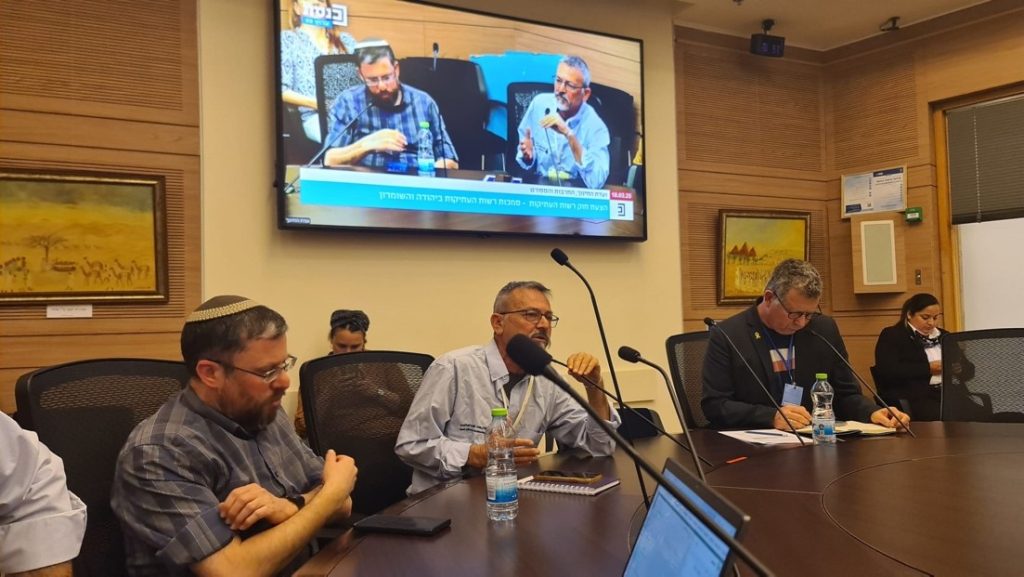Knesset Committee Considers Extending Israeli Antiquities Governance to Areas A and B as well as C
Last week (March 18th), the Knesset’s Education, Culture and Sports Committee held a third discussion on a bill that would subject antiquity sites in the West Bank to Israeli civilian law.
Although the title of the latest discussion was identical to that of the bill discussed in the two previous sessions – which had passed a preliminary reading—Amendment to the Israel Antiquities Authority Law (Jurisdiction of the Antiquities Authority in Judea and Samaria), 2023, the proposal discussed this time was an entirely new bill and its actual title, as it appears in the bill’s subtitle is: Bill for the Regulation of Heritage and Antiquities Management in Judea and Samaria, 2025. This distinction is important, as the current proposal has not passed a preliminary reading and therefore cannot be prepared for a first reading by the committee.
This was the committee’s third discussion of legislation intended to apply the Israeli law to West Bank antiquities sites (the first two took place on November 27, 2024, and February 11, 2025). The initial version of the bill referred to extending the Israeli Antiquities Authority’s (IAA) jurisdiction to the West Bank. Following strong opposition by the IAA and the Archaeological Council, the last two committee meetings discussed creating a new body, which is not the IAA, under the Ministry of Heritage which would be responsible for managing antiquities in the West Bank in place of the Civil Administration’s Staff Officer for Archaeology.

Committee discussion to establish new body to oversee antiquities in the West Bank on March 18th, 2025. From left: Yehuda Eliyahu, Head of the Settlements Administration within the Ministry of Defence, Benny Har-Even, Staff Officer for Archaeology, and Dr. Guy Steibel, Chairperson of the Archaeological Council.
In a troubling development, the committee discussed the possibility that the bill would apply not only to Area C—under full Israeli control—but also to areas A and B. Attending the discussion was Yehuda Eliyahu who directs the Settlements Administration within the Ministry of Defence (under Minister Bezalel Smotrich who is a minister within the Ministry of Defence(. Eliyahu mentioned that a cabinet decision from July 2024 gives the Staff Officer for Archaeology (SOA) enforcement powers in Area B and added that “We think it should also deal with sites in Area A”.
In contrast to prior sessions, the most recent discussion lacked broad participation by the professional archaeological community. Only three professionals attended, in contrast to the wide-ranging opposition voiced by experts in the November and February meetings. The participating archaeologists were Dr. Guy Stiebel (Chair of the Archaeological Council), Attorney Dan Bahat (Legal Advisor to the IAA), and Benny Har-Even (Staff Officer for Archaeology). This limited presence may indicate the weakening position or resignation of the professional archaeological establishment.
Legal advisors from multiple ministries warned the bill violates international law by applying Israeli legislation to an occupied territory under military rule and reiterated the difficulty created by establishing two legal systems within the same territory effectively annulling existing military orders. Notably, for the third time,
the Ministry of Foreign Affairs’ legal counsel was absent from the session.
In this discussion, the SOA Benny Har-Even emphasized two key points:
- a. Thanks to the military government, his power to expropriate private land is broad and should be preserved.
- b. The Staff Officer is not limited to defining heritage sites and can designate post-1700 sites as heritage sites.
The committee discussed Clause 3(c): “Authority to acquire land for the protection, preservation, research, and development of antiquities and heritage sites, according to the Lands (Acquisition for Public Purposes) Ordinance, 1943.” In this context, the Staff Officer clarified that if someone refuses to sell land, he has the authority to expropriate it. Minister of Heritage Amihai Eliyahu requested to add “for the purpose of instilling heritage” to the clause—i.e., to expropriate land for the purpose of conveying values or narrative.
Another key clause would allow private organizations to manage archaeological sites under minimal state oversight. This opens the door for settler organizations, such as those operating in the City of David and Tel Shiloh, to take control of sensitive heritage sites.
Emek Shaveh: The bill seeks to annex areas throughout the entire West Bank, under the guise of heritage preservation in blatant violation of the Oslo Accords and international law. Of high concern is the bill’s vague use of the term “heritage.” Without a clear definition, this opens the door to a broad interpretation, allowing the state or private actors to designate almost any site as a “heritage site” and justify land seizure under that label. By creating a new authority, expanding jurisdiction into self-governed Palestinian areas, and enabling land grabs in the name of heritage, the coalition is effectively preparing the ground for large-scale annexation moves. If this bill seems to be an even bolder iteration than the previous version it is because it is the logical conclusion of an aggressive campaign led by settlers and their allies in the Knesset and government which placed antiquities as proof of historic rights at the heart of their claim to sovereignty over the Occupied Palestinian Territories.
